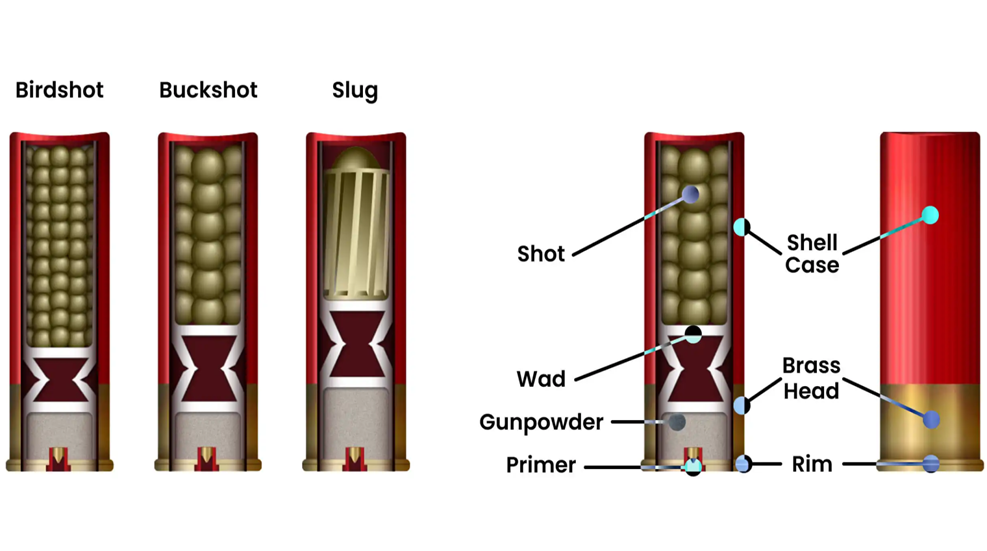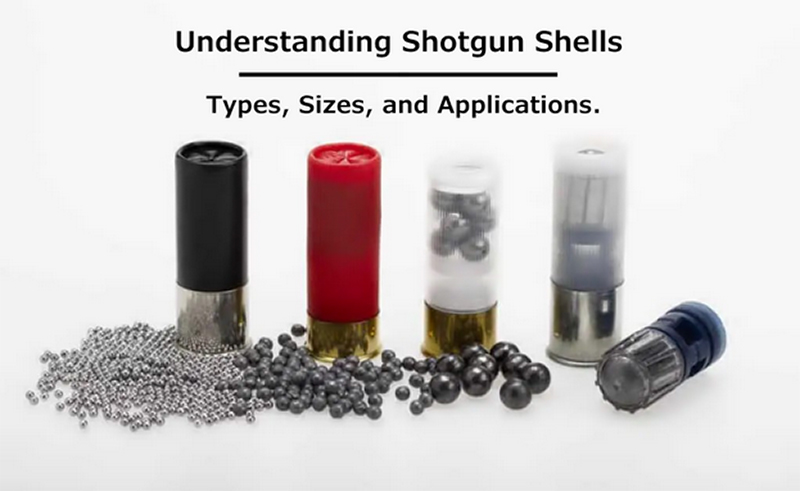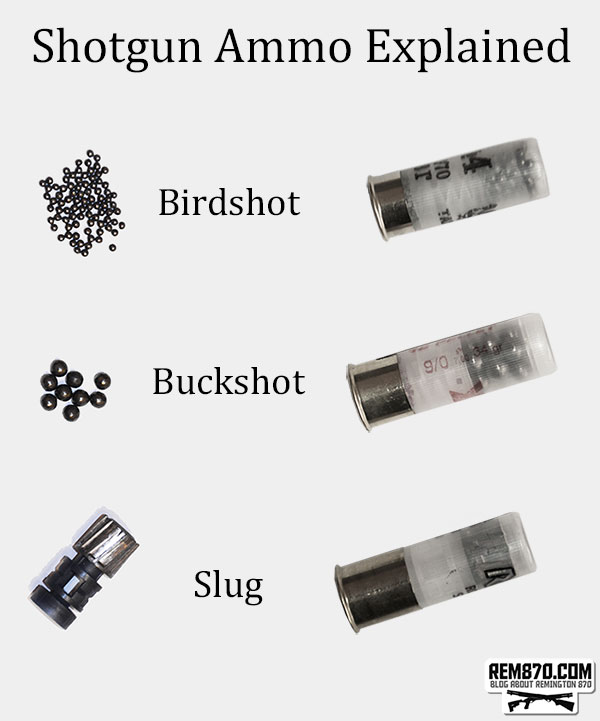When you pick up a shotgun, you might not realize the incredible variety of ammunition at your fingertips. Each type of shotgun shell serves a unique purpose, and understanding them can make a world of difference in your shooting experience.
Whether you’re hunting, target shooting, or defending your home, choosing the right shell is crucial. Are you ready to discover which shell is your perfect match? Imagine the confidence and precision you’ll gain by mastering the basics of shotgun ammunition.
Stick around, because this guide is designed to make you an informed and confident shooter.

Basics Of Shotgun Shells
Shotgun shells come in various types, each designed for specific uses. Birdshot is ideal for hunting small game. Buckshot is used for larger animals, while slugs are for precise, long-distance shots. Understanding these types helps in choosing the right ammunition for different shooting needs.
Understanding the basics of shotgun shells is essential for anyone interested in shooting sports or hunting. Shotgun shells, often referred to as cartridges, are the ammunition used in shotguns. They come in various sizes and types, each designed for specific purposes. Knowing the differences can enhance your shooting experience and improve your skills.Shell Components
A shotgun shell is made up of several key components. The casing holds everything together and is usually made of plastic or paper. Inside, you’ll find the primer, which ignites the gunpowder when struck. The gunpowder creates the explosive force needed to propel the shot. The wad keeps the shot together as it travels through the barrel. Finally, the shot itself consists of small pellets that spread out to hit the target.Gauge And Length
Gauge refers to the diameter of the shell. It’s crucial to match the gauge of the shell with the gauge of your shotgun. Common gauges include 12, 20, and 410, each offering different advantages. Length matters too. Longer shells hold more shot and powder, which can increase power. However, ensure your shotgun can handle the shell length to avoid malfunctions.Shot Size
Shot size determines the size of the pellets within the shell. Smaller pellets are ideal for hunting small game like birds. Larger pellets are better suited for bigger targets. Always consider what you’re aiming for when choosing shot size. Using the wrong size can lead to ineffective shots and wasted shells. Selecting the appropriate shotgun shell depends on your intended use. Are you hunting ducks or shooting clay pigeons? The answer will guide your choice. When I first started hunting, I used the wrong shell size. It taught me the importance of selecting the right type for the task at hand. Always research and test different shells to find what works best for you.Safety Considerations
Safety should always be your priority. Ensure you’re using the correct shell for your shotgun to prevent accidents. Double-check the shell’s gauge and length before loading. Proper storage of shotgun shells is also vital to keep them in good condition and avoid mishaps. Remember, a safe shooter is a successful shooter. Understanding these basics can elevate your shooting experience. Have you ever chosen the wrong shell and learned the hard way? Share your story in the comments and let’s learn together!
Components Of A Shotgun Shell
Understanding the components of a shotgun shell is crucial for any enthusiast. Each part plays a specific role in the shell’s functionality. Let’s explore these components and see how they contribute to a shotgun shell.
Case
The case holds all the components of the shotgun shell together. It is usually made of plastic or brass. The case provides stability and protection for the contents inside. Length and design can affect the performance of the shell.
Primer
The primer is the ignition source for the shell. It is located at the base of the shell. When struck by the firing pin, it creates a spark. This spark ignites the powder, starting the firing process.
Powder
Powder is the explosive element inside the shell. It burns rapidly to generate gas. This gas creates pressure, propelling the shot forward. The amount of powder affects the speed and force of the shot.
Wad
The wad separates the powder from the shot or slug. It helps seal the gases and protect the barrel. The wad also ensures that the shot stays together as it moves through the air.
Shot Or Slug
Shot consists of small pellets used for hunting birds and small game. Slug is a single, large projectile designed for larger targets. The choice between shot and slug depends on the intended use and target.
Gauge And Length Variations
Understanding the gauge and length variations of shotgun shells is crucial for shooters. These variations determine the shell’s performance and compatibility with different shotguns. Choosing the right gauge and length ensures optimal shooting experience, whether for hunting or sport. Let’s explore these key aspects to enhance your shooting knowledge.
Common Gauges
The gauge of a shotgun shell refers to its diameter. The most popular gauges include 12, 20, 28, and .410 bore. A 12-gauge shell has a larger diameter than a 20-gauge. Larger gauges like 12 provide more power and are suitable for larger game. Smaller gauges, like 20, offer less recoil and are easier to handle. For beginners, 20-gauge is often recommended.
Shell Lengths
Shotgun shells come in various lengths, ranging from 2 ¾ inches to 3 ½ inches. Longer shells contain more gunpowder, resulting in more power. Most shotguns can handle 2 ¾-inch shells. Some models accommodate longer shells for increased performance. Check your shotgun’s specifications before choosing shell lengths. Proper length ensures safety and efficiency.

Birdshot Shells
Birdshot shells are ideal for hunting small game and birds, featuring numerous tiny pellets for a wide spread. These shells offer less penetration, making them suitable for close-range shooting. Perfect for beginners, birdshot is a popular choice among various types of shotgun shells.
Birdshot shells are a staple in the world of shotguns, prized for their versatility and effectiveness in hunting small game and birds. These shells are filled with numerous small pellets, making them ideal for hitting fast-moving targets. Their design ensures a wide spread of pellets, increasing the chances of a successful hit, especially in dense environments like forests or wetlands. Whether you’re a seasoned hunter or just starting out, understanding the nuances of birdshot shells can significantly enhance your hunting experience.Uses In Hunting
Birdshot shells are primarily used for hunting small game such as quail, dove, and pheasant. Their design allows hunters to target these agile creatures with precision. The wide spread of pellets is particularly useful in hitting birds in flight, making it a favorite choice for bird hunters. Have you ever been out in the field, watching a flock take off, and felt the thrill of lining up your shot? Birdshot shells can make those moments more successful. They are also used for hunting rabbits and squirrels, where the goal is to minimize damage to the meat.Popular Sizes
Birdshot shells come in various sizes, each suited for different types of game and hunting conditions. The most popular sizes include No. 7.5, No. 8, and No. 9. No. 7.5 is often used for larger game birds like pheasants, providing a good balance between pellet size and quantity. No. 8 is widely used in trap shooting and for hunting smaller birds like doves. It offers a higher pellet count, increasing the odds of hitting the target. No. 9, with even more pellets, is perfect for smaller birds and clay pigeon shooting, where precision is key. Choosing the right size can be the difference between a successful hunt and going home empty-handed. Next time you’re gearing up for a hunt, consider the type of birdshot shell that best fits your target. What will you choose to enhance your hunting success?Buckshot Shells
Buckshot shells are a popular choice for many shotgun enthusiasts. These shells contain multiple metal pellets designed for a wide spread. They are often used in hunting and home defense. The pellets range in size and number, affecting the shell’s performance.
Tactical Applications
Buckshot shells have various tactical uses. Law enforcement often uses them in close-range situations. The wide spread of pellets increases the chance of hitting a target. They are also effective in crowd control scenarios. Hunters use buckshot for large game like deer. The power and spread make it ideal for such purposes.
Size Variations
Buckshot shells come in different sizes. The size refers to the diameter of the pellets. Common sizes include 00, 0, and 1 buck. Larger sizes have fewer but bigger pellets. Smaller sizes have more pellets, offering a wider spread. Each size has its own advantages. Larger sizes are better for bigger game. Smaller sizes work well for smaller targets.
Slug Shells
Slug shells are popular among hunters for their precision and power. Designed for hitting large targets, they contain a single, solid projectile. This type of shotgun shell is ideal for hunting deer and other big game.
Slug shells are a popular choice among shotgun enthusiasts. These shells are designed for firing a single, large projectile. They offer precision and power for specific hunting scenarios. Ideal for hunting larger game, they provide the necessary impact and accuracy.Hunting Large Game
Slug shells are often used for hunting large game. They deliver a powerful blow that is effective for big animals. With a single, solid projectile, they ensure a higher chance of a clean shot. Hunters rely on them for their impressive stopping power. They are preferred in areas where rifles might not be allowed.Types Of Slugs
There are several types of slugs available. Foster slugs are popular for their rifled design. They are easy to load and offer great accuracy. Sabot slugs are another type, designed for smoothbore shotguns. They provide high velocity and precise shots. Brenneke slugs have a unique design with fins, ensuring stability in flight. Each type serves different needs and preferences. Hunters choose them based on their specific requirements.Specialty Shotgun Shells
When you think of shotgun shells, you might picture the standard rounds used for hunting or sport. However, there’s a fascinating world of specialty shotgun shells that cater to unique situations and needs. Whether you’re looking to enhance personal safety or simply add a bit of novelty to your shooting experience, specialty shells offer intriguing options. Let’s dive into some specific types and see how they might fit your needs.
Less-than-lethal Options
Did you know that there are shotgun shells designed to subdue rather than harm? Less-than-lethal options are perfect for situations where you need to defend yourself without causing permanent injury. These shells often contain rubber pellets or beanbags, which can incapacitate a threat without serious consequences. Imagine having the peace of mind knowing you can protect your home without risking a tragic outcome. Have you ever considered how less-than-lethal shells might fit into your personal safety strategy?
Exotic Shells
Exotic shells are where things get a bit wild. These are not your typical rounds; they range from incendiary shells that produce spectacular light displays to flechette shells that fire tiny darts. Have you ever thought about adding a spark to your shooting practice? Exotic shells might be just what you need to break away from the usual routine. While they can be fun and exciting, remember to handle them with care and check regulations in your area. What unique experience are you looking to create with your shotgun?
Whether you’re focusing on safety or seeking a thrilling experience, specialty shotgun shells offer unique benefits. Consider how these options align with your needs and goals. Which type of specialty shell sparks your interest the most?
Choosing The Right Shell
Choosing the right shotgun shell can be confusing. Different shells serve different purposes. Understanding this helps in making informed decisions. The type of shell affects performance, safety, and effectiveness. Let’s explore the factors to consider.
Purpose And Application
Determine the purpose of your shotgun use. Hunting, sport shooting, or self-defense? Each activity requires a specific shell type. For hunting, consider the game size. Small game needs lighter shells. Larger game needs heavier ones. Sports shooting requires target loads. These shells offer less recoil. For self-defense, use buckshot or slugs. They provide maximum stopping power.
Safety Considerations
Safety is crucial with firearms. Always check the shell size. Ensure it matches the shotgun chamber. Mismatched shells can cause damage. Use only quality, reliable brands. Inspect shells for damage before use. Damaged shells are unsafe. Wear protective gear while shooting. Ear and eye protection are essential. Stay informed about local laws. Regulations may limit shell types.
Storage And Maintenance
Shotgun shells come in various types, like birdshot, buckshot, and slugs. Each type requires specific storage to ensure safety and efficiency. Regular maintenance of shells prevents moisture damage and ensures reliability.
When it comes to shotgun shells, how you store and maintain them can make all the difference in their performance and longevity. Proper storage and maintenance aren’t just about keeping your ammunition dry; it’s about ensuring your investment is safe, reliable, and ready for action when needed. Whether you’re a seasoned hunter or a weekend shooter, understanding the best ways to care for your shotgun shells can save you headaches—and money—in the long run.Proper Storage Conditions
Storing your shotgun shells correctly is crucial to preserving their quality. Choose a cool, dry place away from direct sunlight or extreme temperatures. Moisture is the enemy; consider using silica gel packs or a dehumidifier in your storage area to keep humidity at bay. It’s wise to use airtight containers or ammo boxes specifically designed for storing ammunition. These containers can prevent exposure to air and moisture, keeping your shells in prime condition. Always label your storage containers with purchase dates to track the age of your ammunition easily.Handling Precautions
Handling your shotgun shells with care is just as important as storing them properly. Avoid dropping or jostling them, as physical shock can damage the shells and affect their performance. Always check your ammunition for visible signs of wear or damage before use. If you’ve ever had a misfire, you know how unsettling it can be. To minimize this risk, handle your ammunition with clean hands and avoid contact with oils or solvents that can degrade the shell’s material. Make it a habit to inspect your shells regularly, ensuring they remain in top condition. Maintaining your shotgun shells doesn’t require a lot of effort, but it does demand consistency and attention to detail. Are your storage conditions up to par? Are you taking the necessary precautions when handling your ammunition? A few simple steps can ensure that your shotgun shells are always ready for action.Frequently Asked Questions
What Are The Types Of Shotgun Shells?
Shotgun shells come in various types, including birdshot, buckshot, and slugs. Birdshot is used for hunting small game, while buckshot is ideal for larger game. Slugs are single-projectile shells designed for precision shooting and big game hunting. Each type serves specific purposes, offering versatility for different shooting needs.
How Do Shotgun Shells Differ In Size?
Shotgun shells vary in size, measured by gauge and length. Common gauges are 12, 20, and 410, with 12 being the most popular. Shell length influences the amount of gunpowder and shot they contain. Longer shells typically hold more shot, offering greater power and effectiveness for various shooting activities.
What Is The Purpose Of Birdshot Shells?
Birdshot shells are designed for hunting birds and small game. They contain many small pellets that spread widely when fired. This wide spread increases the chances of hitting moving targets. Birdshot is less lethal at long distances, making it suitable for hunting in areas with safety concerns.
Are Buckshot Shells Suitable For Home Defense?
Buckshot shells are popular for home defense due to their stopping power. They contain larger pellets that deliver significant impact at close range. This makes them effective for self-defense situations. However, it’s important to consider the potential for over-penetration and ensure safe use in residential areas.
Conclusion
Shotgun shells come in many types, each serving unique purposes. Birdshot suits hunting birds, while buckshot works for larger game. Slugs provide power and precision for big targets. Knowing shell types helps you choose wisely for your needs. Safety and understanding are key when handling shotguns.
Always follow safety guidelines and practice regularly. This ensures a safe and effective shooting experience. Make informed choices to match your shooting activities. Understanding your options boosts confidence and performance. Remember, the right shell can make a difference in your shooting success.
Enjoy the sport responsibly and stay informed.

